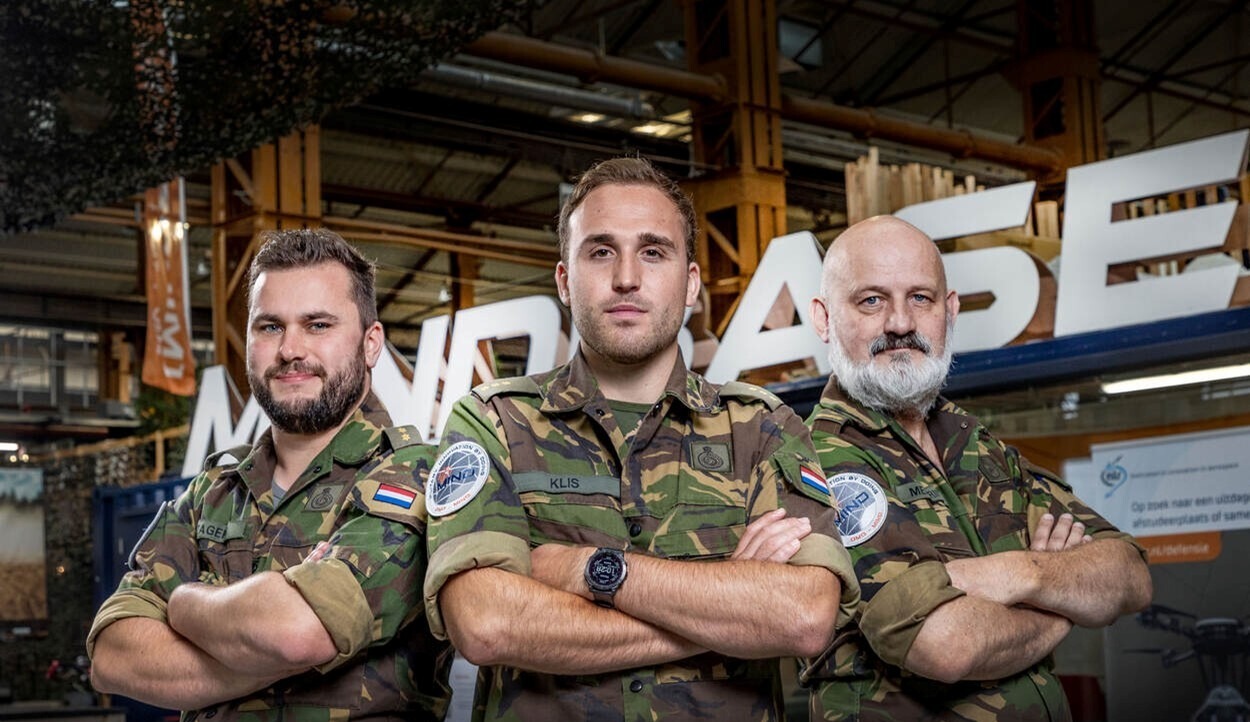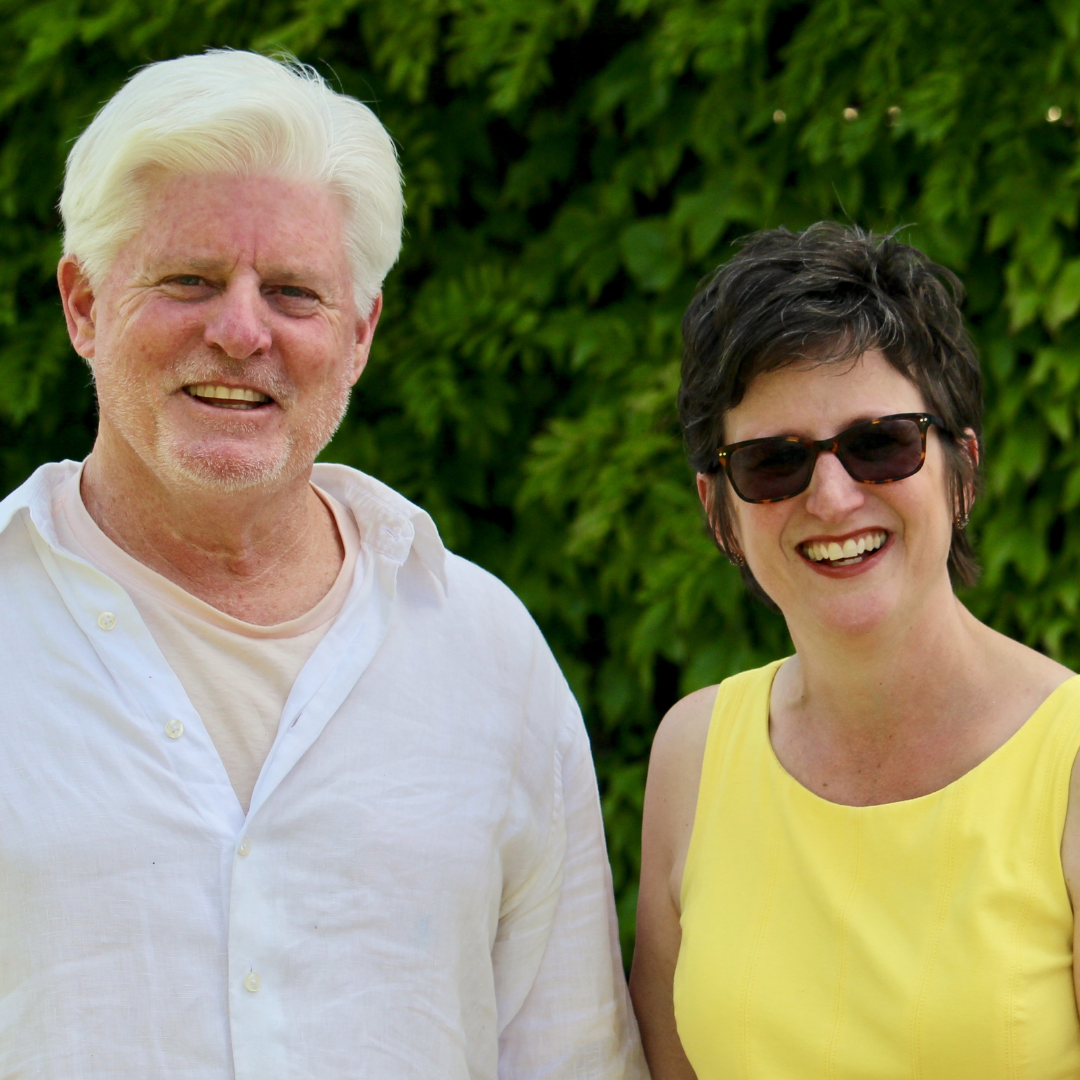


MINDbase, a dynamic initiative now embedded in High Tech Campus Eindhoven. Bas Klis, a young and energetic Innovation Manager with the Dutch Ministry of Defense, is on a mission to tap into the world of civilian technologies that can enhance safety, sustainability and resilience within military operations.
Forget the image of weapons and warfare. Bas’s focus is on dual-use technologies that support everything from logistics to health, nutrition and digital security. “It’s about using civilian ingenuity to protect and support,” he explains. Whether you're building smart sensors, drones, medtech or cybersecurity tools, Bas and his team would gladly get in contact with you. MINDbase is more than a scouting outpost; it’s a call to action for startups and researchers to collaborate on solutions that matter.

From left: Rick Zagers (Rotterdam), Bas Klis (Eindhoven) and Teus Meijering (Enschede).
The 27-year-old innovation manager at the Netherlands Ministry of Defense sat down recently to detail his role in bridging military needs with civilian innovations. He highlighted the defense organization's shift from a static budget to a growing focus on the importance of dual-use technologies. He emphasized Dutch policymakers’ increasing openness to innovation in enhancing military capabilities without focusing on weaponry.
With a background in mechanical engineering, Bas has been in the Royal Netherlands Army for seven years. Three years ago, he became Innovation Manager for a Dutch military program called Military Innovation by Doing, or MIND. MINDbase Eindhoven is one of seven regional teams deployed across the Netherlands – each with a different domain focus – including MINDbase at High Tech Campus Eindhoven. Bas is all about the problems he can help solve in partnership with startups and research organizations.
Innovation and “rethinking” the Dutch military
Bas’s efforts to connect with startups is part of a larger rethinking of the military’s role in the Netherlands.
The Dutch military has increased funding and is pushing for more military personnel. Reuters recently reported the Dutch government aims to increase defense spending by an extra 1.1 billion euros ($1.3 billion) annually from this year. And the Dutch Ministry of Defense has confirmed it aims to more than double its military personnel, from 70,000 to 200,000 by 2030. “You know the geopolitics; the world is not getting safer right now. In these times, we need a better defense organization to defend ourselves and our allies in NATO. We want to be sure that aggression from the outside is not going to be the norm.”
For his part, Bas has to think differently, identifying innovations in the civilian world that are relevant to the military, excluding weapon systems. “That's not at all what we're looking for. It’s all the things that support the mission,” he said. Bas says to think of the military like a small society: “We have clothes, we have food, we have medical (clinics), we have logistics … you name it. What’s relevant in the civilian world is also relevant for the military. A lot of people are working on the innovation without being aware ould be interesting for us. We can help them.”

Jose van Uden, Project Manager 3D Food and Pharma Printing at TNO, demonstrates the food “containers” as they move through “filling stations” during the 3D foot printing process.
The military needs the latest technology in a wide range of domains, from cybersecurity to software to developing nutritious, personalized foods so soldiers in the field can maintain their energy and morale. (Bas partnered last year with TNO on IMAGINE, a project to produce 3D printed personalized food at HTCE. You can read the article here.)
Bas used examples of collaborations, such as using flexible printable electronics for medical applications and drones for security. He also mentioned startups such as alphabeats, an alumnus of HighTechXL, the Netherlands’ only deep-tech venture builder, also located at HTC 27.
Alphabeats creates immersive alpha brainwave training experiences using music and neurofeedback technology developed at Philips. “In a combat situation, it's hard to relax because you're still alert. You're still jumpy,” he said. “The hypothesis we are looking into is the idea that alphabeats’ innovation can help military personnel with stress-related issues.”
Projects with promise include, but are not limited to:

The “Badger” guard robot with project team members.
To go from concept to a revolutionary product involves a lot of steps, and the Ministry of Defense is here to help with that, Bas said.
“I am there to solve a puzzle, pulling together all the pieces: innovation, financing, a project leader, someone willing to put in time and effort to test and to develop further. Once the project is ready to start and everything is accounted for, the project team in Utrecht takes over.”
Investment for innovation
The Ministry of Defense can only pay an organization for a project in a customer-supplier relationship, Bas said. Startups generally need lot of capital beyond simple transactions as they grow into companies. “They need structural financing.”
The ministry has a new €100 million fund that can do structural and incidental financing. SecFund supports startups, scale-ups and innovative SMEs that contribute to the innovation needs of the Ministry of Defense. The SecFund is focused on dual-use solutions which strengthen national security and strategic autonomy in The Netherlands, providing early-stage financing to innovative Dutch enterprises working on technologies or products that can be used for both civilian and military applications.
The fund is a collaboration between the Ministry of Defense, the Ministry of Economic Affairs and the Regional Development Agencies, united under ROM-Nederland. The Brabant Development Agency (BOM) manages the fund on behalf of all regional development agencies.

Bas Klis can be seen at left (in uniform) at a HighTechXL hackathon, “FasTrackathon,” in 2023.
Growing MINDbase at High Tech Campus
In the early days, Bas scouted talent. Three years ago, when he started out as Innovation Manager, he attended Drinks, Pitches & Demos and FasTrackathon and other hackathons organized by HighTechXL.
Since opening an office recently at HTC 27, more startups are coming to him, and here’s the cool thing … you can just walk in. His teams are focused on military innovation by doing, not talking, and projects can come together quickly.
Bas mainly focuses on organizations working on innovations with high Technical Readiness Levels, or TRLs. “We test it [technology]. We develop it together with them with the security and robustness required of military products, then we deploy it throughout the organization,” he said.
If you have an innovation that may be interesting to the Dutch Military of Defense, get in touch with Bas at MINDbase: MINDbaseEindhoven@mindef.nl or stop by HTC 27 and talk to Bas directly.